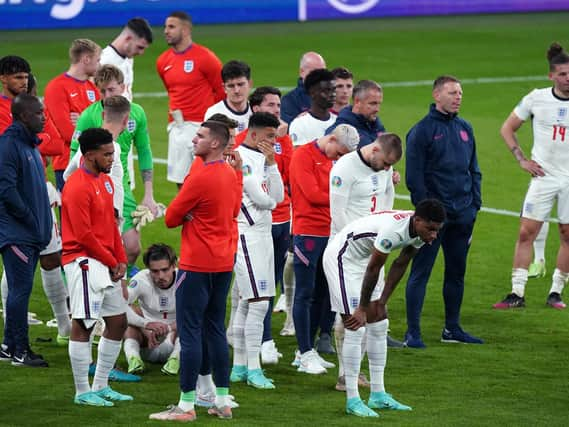The psychology of penalty shootouts after England's devastating loss in Euro 2020 final


Gareth Southgate's side were taken to a penalty shoot out following a 1-1 draw in Sunday night's final at Wembley.
It was Saka who saw his decisive spot-kick saved by Gianluigi Donnarumma and the Italians were crowned European champions following a 3-2 victory on spot kicks.
Advertisement
Hide AdAdvertisement
Hide AdDr Andrew Manley, a Principal Lecturer in Sport & Exercise Psychology at Leeds Beckett, said that the mental side of a penalty shootout is often the hardest part.
Dr Manley said: "Sven-Göran Eriksson said on reflection of his time as England manager that one of his biggest regrets or the one thing he would have done differently is actually taken a team with him to prepare for things like the penalty shootout because of the mental side that goes along with that.
"It's not kicking the ball into a net. There's a mental preparation and a mental performance side to it."
One of the key preparations for penalty shootouts is being able to focus on what you can control and using it to your advantage, Dr Manley said.
Advertisement
Hide AdAdvertisement
Hide AdDr Manley said: "It's a challenge to really prepare for a penalty shootout because the one thing that is very, very difficult to recreate is the unique pressure you will feel in that situation, particularly in a final major championship, when it's on home soil with 60,000 people hoping and willing you to do well and you know that there are consequences of either succeeding or not succeeding.
"The things that we might do as practitioners and is say let's focus first of all on what is in your control'.
"There are lots of things that you only have so much control over, the crowd, for example, you can't control that - but you might ask yourself, how do you use that to your advantage?
"It might be that things that you find the crowd useful as a way of giving getting you in the right frame of mind, getting you to access the right emotional state, to help you perform well.
Advertisement
Hide AdAdvertisement
Hide Ad"It's about getting to control your responses to certain stimuli as best as possible.
"So one of those things might be, just imagining and visualising what the environments gonna look like.
"You can't just go down the park and recreate this so you maybe have to watch videos of other people taking penalties in those environments, and understand yourself and how you're going to respond to those environments.
He added: "Another thing that we talk about as as practitioners with performance is what sort of emotional emotional state do you find most helpful to you to perform well?
Advertisement
Hide AdAdvertisement
Hide Ad"We break it down in terms of, 'do you feel that you are challenged by?' that because there's going to be an element of pressure that you want that pressure to be helpful.
"We might call those challenge states where they're associated with a sense of 'I feel the pressure here, but I I have the resources available to be able to be successful' versus, finding yourself in certain environments feeling threatened.
"A threat state, 'n comparison to a challenge state, is more about. 'I'm really worried here that I don't feel like I have the ability to be successful, I have a lower level of self belief or confidence'.
"What we would do as practitioners is work with with performers to try and help them access as much as possible, what we call a challenge, state where they feel emotionally empowered, but they are able to access an emotional state which will facilitate performance of physical skills more readily and give them the self belief and confidence to execute when it matters.
Advertisement
Hide AdAdvertisement
Hide Ad"It really is what the job of a sports psychologist is is to try and get close perspective, performance sees how the performer feels, and then try and get them to utilise that to their advantage.
"Every individual will have to work out to some degree, based on evidence, based on guidance, and based on knowing themselves, what's the optimal way to give them the best chance of success in a penalty shootout."
Dr Manley said despite the devastating loss, the can learn from it and move forward to become even stronger players.
He said: "It's got be the toughest place for any performer to be right now is where it's come down to the wire and something that they've had the courage to take on and approach with a lot of bravery has, has not gone in terms of the outcome, the way they would like it to have
Advertisement
Hide AdAdvertisement
Hide Ad"That's going to be an incredibly difficult thing to process.
"There'll be reflection, they'll be kind of looking back and asking yourself, okay, could I have done any more but in that moment, can they ask themselves truly 'have actually stepped up done my best'?
"I'd say to them 'be kind to yourself'. Putting your hand up and being willing to take a penalty.art of the process that deserves credit.
"The future is often determined by what you learn from difficult encounters that you've experienced prior to that.
Advertisement
Hide AdAdvertisement
Hide Ad"As far I can see about the way the England team, management team and the support staff have done everything they possibly can to create a really facilitated environment, a real culture of togetherness a culture of being in this together and there is a real integrity in how they go about doing things.
"I think that's something that's going to stand this men's England team and other teams perform are in really good stead."